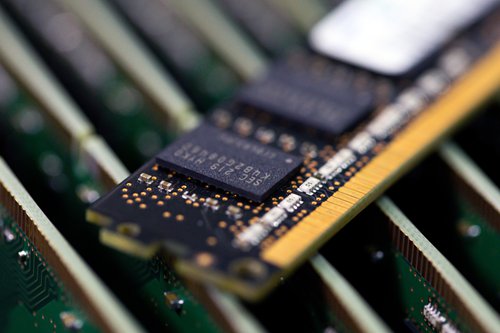Japan, S. Korea, China could expand tech partnership: expert
Source:Global Times Published: 2020/5/18 20:13:41

A view of Samsung Electronics' memory module Photo: VCG
South Korea-based technology giant Samsung Electronics' heir apparent visited the firm's only foreign memory chip plant in Xi'an, Northwest China's Shaanxi Province, to assess an expansion plan.
The visit transpired on Monday, coinciding with news that Japan may ease travel curbs for businesspeople and researchers from a number of countries, including China and South Korea.
There is no evident connection between the trilateral exchange in the technology sphere and the US government's tightening supply restriction on Huawei, said an industry watcher from one of China's most prestigious universities, but the US move - which makes no commercial sense - is deemed unwise and self-destructive.
The Xi'an inspection was Samsung Electronics Vice chairman Lee Jae-yong's first overseas business trip since he went to Brazil in January, according to Yonhap News Agency. The de facto leader of Samsung previously visited the Chinese plant in February 2019.
"To secure new growth engines, we need to be preemptive and be prepared for forthcoming changes," Yonhap reported, citing Lee's comments. There's no time to spare, Lee said.
The South Korean conglomerate's first-quarter chip production soared 57.4 percent year-on-year, despite the coronavirus onslaught, its quarterly statements revealed on Monday.
Samsung hasn't responded to a request for comment on the visit or details of the proposed expansion.
Meanwhile, Japan may ease its coronavirus-related travel curbs on businesspeople and researchers from some countries and regions such as China and South Korea, Japan's Mainichi Shimbun newspaper reported on Monday.
The US is also on Japan's list for the planned easing, the report said, and the timing of any relaxation will be decided in accordance with virus control.
China's technology cooperation with Japan and South Korea are primarily driven by their business prospects, Wei Shaojun, director of the Institute of Microelectronics at Tsinghua University, told the Global Times on Monday. China's huge market puts the nation in an advantageous position to survive the US' relentless attack on Huawei.
In a fresh blow targeting Huawei, the US Commerce Department announced on Friday it would tighten export controls on the Chinese technology giant and its subsidiaries, intending to paralyze the Chinese telecom giant's chip-making capability.
The US has gone too far, putting many of its own businesses at risk, Wei stressed.
In case of a total China-US technology decoupling, US semiconductor firms could lose 18 per cent of their combined global share and see their revenues plunge 37 percent in the next three to five years, according to a Boston Consulting Group report in March, which assessed the risk of the bilateral tech friction.
Global Times
Posted in: INDUSTRIES,COMPANIES,BIZ FOCUS